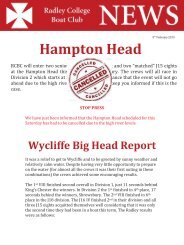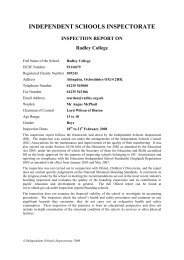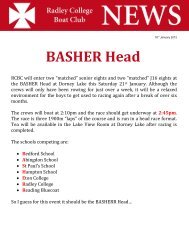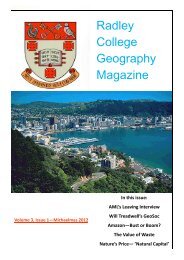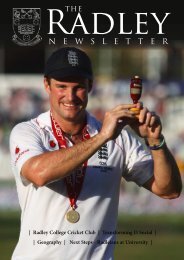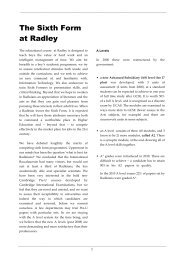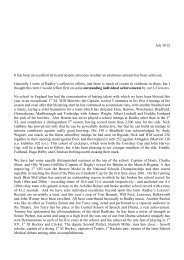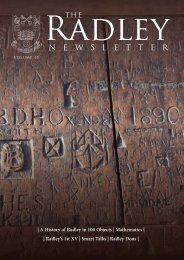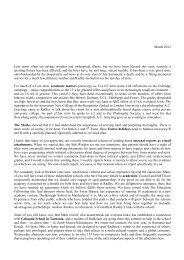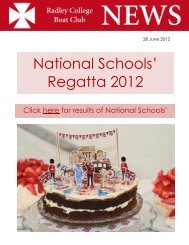Obituaries - Radley College
Obituaries - Radley College
Obituaries - Radley College
You also want an ePaper? Increase the reach of your titles
YUMPU automatically turns print PDFs into web optimized ePapers that Google loves.
<strong>Obituaries</strong><br />
Chemical Industries and Newsweek. He<br />
himself retired from serious driving in<br />
1985, having personally won three national<br />
championships. His Ardmore team won a<br />
combined total of seven championships and<br />
over 100 races in ten years.<br />
At the end of 1978 Creighton Brown<br />
joined forces with Ron Dennis’s Project Four<br />
Racing, and was then involved with Ron and<br />
designer John Barnard in the take-over of the<br />
McLaren Formula 1 team in 1980. During<br />
his time as one of the directors of the team<br />
between 1980-1992, McLaren won no less<br />
than 7 constructor’s and 8 driver’s World<br />
Championships.<br />
In 1990 Creighton was asked to set up<br />
McLaren Cars Ltd., together with McLaren’s<br />
then Formula 1 Technical Director Gordon<br />
Murray, with the simple brief to produce the<br />
world’s most advanced and desirable sports<br />
car. The result was the revolutionary carbon<br />
fibre, 240 m.p.h. McLaren F1 – the fastest<br />
production road car on Earth. This handbuilt<br />
car, using contemporary Grand Prix<br />
technology has been universally acclaimed<br />
as an all-time classic and an engineering<br />
masterpiece. A special ‘GTR’ racing version<br />
won the Le Mans 24 hours race at the first<br />
attempt in 1995, and totally dominated the<br />
World Sports Car Championships in 1995 and<br />
1996.<br />
Creighton Brown was a director of M.R.S.<br />
Management Ltd, which specializes in the<br />
management of young professional race<br />
drivers. He was also a director of Leisurebox<br />
PLC, a UK leisure group, and continued to<br />
farm and own various development properties<br />
in Berkshire and Rio Grande do Sul, South<br />
Brazil.<br />
He had also established South American<br />
Sports Cars, in Santa Catarina, South Brazil,<br />
together with a second, highly confidential,<br />
project, which, in association with a global<br />
motor manufacturer was involved in the<br />
design and development of a revolutionary<br />
limited production sports car.<br />
Cadogan On 18.5.2006 Alexander John<br />
Cadogan (g, 1951-1955). He became Sales<br />
Director of J.R.Burrows Ltd., of Batley in<br />
Yorkshire. He had an abiding interest in<br />
gardening, old houses and Scotch Whisky,<br />
and a blossoming interest in accumulating<br />
grandchildren. His brother, O.R. Cadogan and<br />
son, C.A.E. Cadogan, were at <strong>Radley</strong>.<br />
Knight On 15.1.2006 Patrick Vernon<br />
Knight (f, 1951-1955). After a Short Service<br />
Commission with the Royal Hampshire<br />
Regiment he went to Harper Adams<br />
Agricultural <strong>College</strong> and was involved in<br />
farming from 1959 to 1990 before joining<br />
British Telecom in Gloucester. He was<br />
Chairman of the local Royal British Legion<br />
branch and Chairman of the Forest of Dean<br />
Male Voice Choir.<br />
His son, James Knight (who was at<br />
Monmouth) writes:<br />
My father died on Sunday 15th January from<br />
a sudden heart attack. He was a keen rower<br />
for <strong>Radley</strong>, for the Army and for Harper<br />
Adams. He met my mother at Hereford<br />
Regatta whilst rowing for Harper Adams<br />
and so it was rowing in a way that brought<br />
him to the Wye Valley. Although an Old<br />
Radleian, he was an eager supporter of local<br />
rowing always cheering for Ross, Hereford<br />
or Monmouth. I once lost a bet to him at<br />
Hereford Schools Regatta. The bet was that<br />
my 1st VIII crew would beat the <strong>Radley</strong> 1st<br />
VIII crew... who would pay for my choccy<br />
blazer rested on the outcome... I’m sorry<br />
to say we lost and true to the bet I had to<br />
buy my own blazer. He was there to see my<br />
first single win at Mumbles Regatta in 1987<br />
for Ross, carrying the boat on his car. He<br />
took me and the boat through the tortuous<br />
one way system in Shrewsbury to attend<br />
Pengwern Regatta. He followed the fortunes<br />
of our first boat avidly and was a great fan of<br />
the beer and the welcome down at Llandaff.<br />
He even made it up to Strathclyde to watch<br />
the National Championships when we won<br />
silver in 1989. He continued supporting my<br />
rowing when I restarted with Maidstone<br />
Invicta and was very proud when his son<br />
was elected to be Captain.<br />
Gibson On 20.10.2005 Robert Primrose<br />
Gibson (f, 1953-1958).<br />
From Peter Goodchild’s address at the<br />
service:<br />
I am sure that I am not alone in feeling such<br />
a deep sense of shock that I’m here this<br />
morning at Robert’s funeral. The cruel pace<br />
of his final illness has a great deal to do with<br />
this, and, of course, his relative youth, but<br />
it’s not just that. It is that Robert was a fixed<br />
point in so many of our lives.<br />
He was a rock, a considerable person,<br />
conservative in the best sense, perhaps even<br />
someone born out of his time. But Robert<br />
had something almost unfashionable today,<br />
a clear idea of what he thought was right<br />
and what he thought was wrong.<br />
I’ve known him since we were both six,<br />
both starting at the same prep school on<br />
the same day in September 1946. I knew<br />
both his parents and have little difficulty<br />
in relating his sterling character to the way<br />
he was brought up. Janie and John Gibson,<br />
his parents, were both Scottish, both<br />
Presbyterian and they had been trying<br />
for a family for 20 years when Robert<br />
was born – 66 years ago today. Janie was<br />
44, John was 46. They were old parents,<br />
even by today’s standards, and theirs were<br />
Edwardian and Scottish values.<br />
Then, from the age of nine, until he left<br />
<strong>Radley</strong> 10 years later, he was sent away to<br />
school. At such a young age it was truly<br />
traumatic. He remembered trying to cover<br />
up the tears when his parents left him. But<br />
his natural abilities meant that at least he<br />
fitted in easily. I remember him when we<br />
first met, as the youngest boy in school,<br />
literally glowing with promise – good at<br />
games, academically extremely bright, the<br />
Victor Ludorum at the school sports.<br />
He was captain of football at his prep<br />
school, and at <strong>Radley</strong> where he was a<br />
wet bob, and rowed, he was to become a<br />
member of the first eight and to row at<br />
Henley. I remember watching him race<br />
and then meeting him on the towpath,<br />
dressed in white braided blazer, white<br />
flannels, a school cap – and carrying an<br />
umbrella. He looked the epitome of the<br />
public school. His home background along<br />
with what was then an almost Victorian<br />
education had shaped him creating a rolemodel,<br />
which may seem archaic today but<br />
which made him the remarkable person<br />
he was.<br />
I saw a great deal of him over the four<br />
or five years after leaving school and I<br />
saw the characteristics I thought typified<br />
him to the end. He was absolutely honest,<br />
he was straight, he was dependable, he<br />
was loyal. His father died when he was 19<br />
and while I question whether, by modern<br />
standards, he was particularly close to his<br />
mother, he was absolutely loyal to her, an<br />
ideal son.<br />
Largely because of his father’s death, he<br />
gave up his chemistry course at Imperial<br />
<strong>College</strong> and joined Bitumen Industries,<br />
the family business. During this time we<br />
were sharing our bachelor years together.<br />
We shared the slings and arrows of our<br />
sexual fortunes in long and great detail.<br />
We went on hopefully predatory holidays<br />
down to the West Country and across the<br />
Continent. I remember how organised<br />
he was even then, with passports in one<br />
envelope, green insurance documents in<br />
another, ferry tickets in another and so on.<br />
I remember, too, how on the last of these<br />
holidays, to Italy in 1962, he lacked any<br />
enthusiasm whatever for the chase – he<br />
was a thorough wet blanket, because just<br />
before we left, he had been to a party in<br />
London where, in truly chivalrous style,<br />
he had rescued a young nurse from the<br />
64 t h e o l d r a d l e i a n 2 0 0 6



